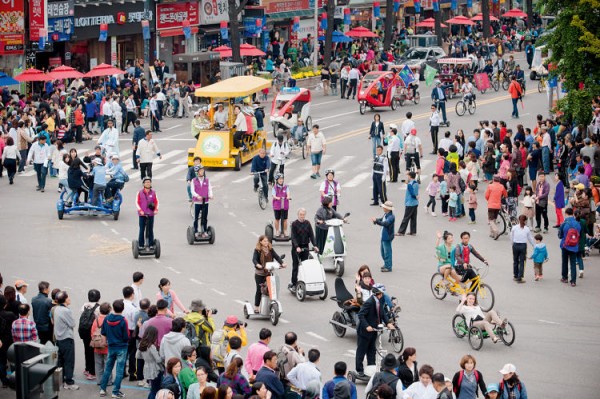No cars
 Twitter is my media feed. They make it easy to scroll through the highlights and when something catches my eye then I click on it and read the full article. There was an article in Fast Company that caught my eye this past week that I keep thinking about. It is about an average neighborhood in South Korea that embarked on a journey to get rid of all cars for one month.
Twitter is my media feed. They make it easy to scroll through the highlights and when something catches my eye then I click on it and read the full article. There was an article in Fast Company that caught my eye this past week that I keep thinking about. It is about an average neighborhood in South Korea that embarked on a journey to get rid of all cars for one month.
It was ambitious but the timing is really relevant as transportation is an area going through massive disruption. Cars will soon be driven for us by software, hopefully more money will go into trains to transport people from city to city, as more people live in urban areas (I believe something like 80% of the world in the next decade) that bicycles become one of the number one transportation vehicles, that sharing vehicles will become more important, that you can use services like Scoot, etc.
This project was called the Ecomobility Festival with an eye towards the future. The planning process took two years. They handed out temporary bikes, they rerouted buses, they gave out electric scooters. They also allowed cafes to expand onto the sidewalks.
After the month long project the city officials spent a lot of time talking to residents of the community including shop owners, educators, etc. The town really did not want to go back to the way it was before but to make some changes based on the success of the project. Wider sidewalks, lowering of the speed limit, eliminating parking areas inside the city to encourage people to walk and use bikes more. The community united in a different way. There will be one day a week where the city becomes a car free zone again going forward.
The project cost $10m to do. Konrad Otto-Zimmerman, who is the visionary behind this project, is taking the show on the road. Next stop Johannesburg.


Comments (Archived):
Interesting experiment. I’m following this trend & the sharing economy closely. There’s a new book on this topic coming out June 10 by Robin Chase called Peers Inc.
Love this. It highlights one of the things I enjoyed about living and visiting around Europe; walking as part of daily life and many cities there built for it. In contrast, many US and Canadian big cities have stretched out layouts, where just walking up the street to the store is not practical. Hard to imagine entire no-car neighbourhoods being implemented here.
When in Quito Ecuador a few years ago most of the city was closed to vehicles on a Sunday. What joy to see kids etc biking, skating etc down the highways it was a city transformed http://en.wikipedia.org/wik…In Germany a few years later I happened upon an autobahn that had been closed to traffic – just amazing to see thousands of folks biking & walking on it.These events are so wildly popular it makes you wonder why the car lobby is so powerful 🙁
Lobbyists. So layered.
Because there is more money to be made in driving than walking.
Here is a pic I took of the autobahn https://plus.google.com/pho… part of the Still Life festival http://www.transportgooru.c…
That’s the coolest thing ever.
Totally agree. I’m kind of obsessed
Amazing! I can’t believe they pulled it off. Thanks for sharing!
Although South Korea has an extremely efficient Metro system, the bus system is in dire need of modernisation. In my experience, South korea is a country that has an infatuation with cars that parallels the U.S. and don’t really see them giving up their cars anytime soon. I see transportation in South korea moving more towards electric trams, similar to Switzerland.However it’s a very interesting experiment.
Interesting. I found the electric trains in Switzerland really great
Having worked in Taegu and living in Switzerland now I agree with you both.Sadly Switzerland is losing its grip – Cars are winning. Many cities also have free bicycle lending schemes (Great for the tourist economy as transport is a huge overhead for visitors)
I think the Swiss like their cars when they moving around Europe- to go into France and Germany for example, but since Swiss residents pay for their trams via the govt, it’s a really efficient, great system I hope more Asian nations will adopt.
It’s so easy to get around in Switzerland, and more importantly, their public transportation is dog friendly as well, unlike the UK tube/ bus system.
A very good article on the subject here:http://www.theguardian.com/…Alternative solutions should also come from the private sector with new products, new business models. But don’t count on Big Auto. They are protecting their legacy, they are maintaining the status quo. Among other startups trying to reset mobility, Mobotiq is proposing one of the most viable solution.Check it atwww.mobotiq.com
There are no cars on the island on which we live in HK, and the hills near our house make biking impractical, so we have to walk everywhere. Our world has shrunk accordingly — not a bad thing as it turns out.